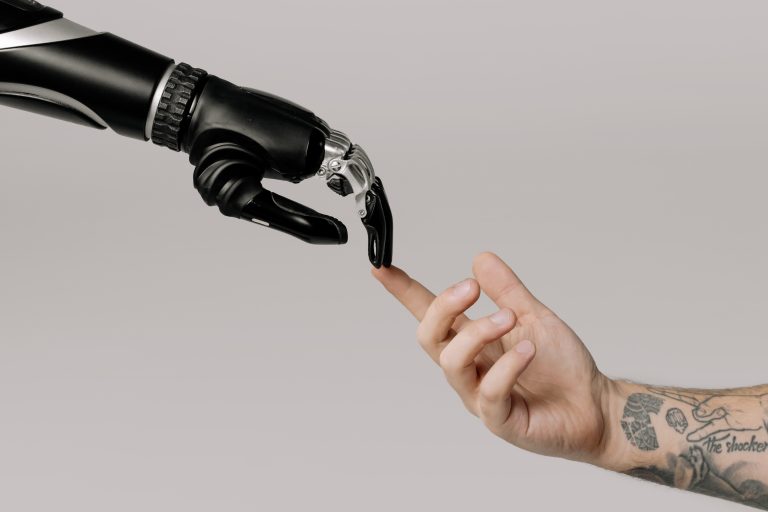In this Article
Av Matteo Alessandro
Av Matteo Alessandro explores themes surrounding Artificial Intelligence and law. AI is playing an increasingly important role in the legal industry. Consequently, how does the development of AI affect the practise of the law? Will you be seeking advice from a machine or from human lawyers in the future? Continue reading to find answers to these fascinating questions!
What is Artificial Intelligence?
Artificial Intelligence and Law
Artificial Intelligence (AI) is the simulation of human intelligence in machines that are programmed to think and act like humans. As such, AI harbours the ability to learn from experience and adapt to new information. Subsequently, AI solves problems in ways that are similar to human cognition.
In theory, one can apply AI technology to a wide range of fields. This includes healthcare, finance, and customer service, to automate and improve various processes. Ultimately, AI research goals aim to create machines that can think and act intelligently, just like humans.

Is AI Dangerous?
Artificial Intelligence and Law
Furthermore, AI has the potential to be dangerous if it is not designed, developed, and used responsibly. Also, AI systems are only as good as the data they are trained on. When the data is biased or misleading, AI systems may make unfair or harmful decisions. For instance, if it is trained on biased data, against certain groups of people, it may make discriminatory decisions. Additionally, AI is becoming more advanced. Thus, it progressively makes decisions without human oversight, risking unpredictable or dangerous behaviour. Conclusively, it is important for those developing and using AI to ensure that they design and use in a safe, fair, and transparent way.
AI and Law
Artificial Intelligence and Law
AI is playing an increasingly important role in the legal industry. It automates time-consuming and repetitive tasks and helps lawyers to be more efficient and productive. In turn, AI enables them to provide better and more cost-effective services to their clients.
There are several ways in which lawyers can use AI. Including:
- Legal research. Lawyers can use AI-powered legal research tools to quickly and accurately search for relevant case law and legal information. These tools help lawyers save time and improve their research efficiency.
- Predictive analytics. Lawyers can use predictive analytics to forecast the likely outcome of a case based on past legal precedent. This helps lawyers make more informed decisions about how to approach a case.
- Contract review. AI-powered contract review tools help lawyers quickly and accurately review large numbers of contracts. Subsequently, this also identifies potential issues and that may require further attention.
- Due diligence. Lawyers can use AI to assist with due diligence in mergers and acquisitions, helping to identify potential legal risks and liabilities.
- Legal document drafting. AI-powered tools can help lawyers automate the process of drafting legal documents. These include contracts, wills, and leases, reducing the amount of time and effort required.
Will AI Replace Lawyers?
Artificial Intelligence and Law
It is unlikely that AI will replace lawyers. While AI can assist lawyers with certain tasks, such as legal research and contract review, there are many aspects of the legal profession that require human judgement, creativity, and empathy.
Naturally, legal strategy, negotiation, and representation in court all require complex cognitive abilities. These are difficult for AI to replicate. Therefore, it is more likely that AI will augment and assist lawyers, rather than replacing them entirely.

How Should AI be Regulated?
Artificial Intelligence and Law
The legal regulation of AI is an evolving and complex issue. As AI technology becomes more advanced and more widely used, there is a growing need for laws and regulations to govern its development and use.
Some possible approaches to the legal regulation of AI include the following.
- Setting standards for AI design and development. Governments and industry organisations can establish standards for the design and development of AI systems. In so doing, they ensure that they are safe, fair, and transparent. Furthermore, these standards cover areas such as bias, accountability, and explainability.
- Ensuring accountability for AI systems. Legal frameworks can be put in place to hold those responsible for developing and using AI systems. Subsequently, they are made accountable for their actions. This includes provisions for liability, such as requiring developers to take out insurance to cover harm caused by their AI systems.
- Protecting consumers from harmful AI. Governments can pass laws to protect consumers from harmful AI. Furthermore, they can require companies to disclose when they are using AI and what data they collect. This ensures that consumers are aware of how their data is being used and have the ability to opt out if they wish.
- Developing ethical guidelines for AI. Governments and industry organisations can develop ethical guidelines for the development and use of AI. In so doing, they ensure that it is used in a way that is fair and respects the rights of individuals. Consequently, these guidelines could include principles such as transparency, non-discrimination, and accountability.
- Overall, the legal regulation of AI should be flexible and adaptable to allow for the rapid development of this technology. While also providing sufficient protections for individuals and society.
Conclusion
Artificial Intelligence and Law
In conclusion, AI is increasingly being used in the legal profession to assist with legal tasks. These include legal research, contract review, and predictive analytics. While AI has the potential to greatly improve the efficiency and accuracy of these tasks, there are concerns about its potential impact on the legal profession. Furthermore, one must not exclude the possibility of job displacement, even if partly.
As AI technology continues to advance, it is important for the legal industry to develop appropriate regulations and guidelines to ensure that it is used in a safe, fair, and responsible manner. By working together, lawyers and AI can create a brighter future for the legal profession. Additionally, AI can help to ensure that justice is served. The best part? This whole article was written by AI, specifically ChatGPT, developed by OpenAI.
OpenAI is an artificial intelligence research laboratory which was founded in 2015 by Elon Musk. This lab has the goal of promoting and developing friendly AI. Furthermore, OpenAI focuses on creating AI technology that is beneficial to humanity and is committed to ensuring that AI is developed and used in a responsible and ethical manner. The organisation conducts research in a variety of areas. Including machine learning, robotics, and economics, and has made significant contributions to the field of AI.
More about MK Fintech Partners Ltd.
Michael Kyprianou Fintech Partners Ltd. is a Maltese company providing services in the FinTech sector. It comprises a team of dedicated experts who provide services such as Legal Advisory, Crypto Licensing, Token Issuers’ Licensing, Investment Services Licensing, and registrations of activities related to Fintech, Crypto, Blockchain & Data Protection, Investment Funds Services & Banking, Company Incorporations, and M&As.
MK Fintech Partners forms part of the Michael Kyprianou Group, a top tier international legal and advisory firm. It has established an enviable reputation as a broad-based legal practice over the years. Mainly by keeping at heart its principle to always exceed its clients’ expectations. MK has grown to become one of the largest law firms in Cyprus with offices in Nicosia, Limassol and Paphos. The MK Group’s international presence also includes fully-fledged offices in Greece (Athens and Thessaloniki), Malta (Birkirkara), Ukraine (Kiev), the United Arab Emirates (Dubai), United Kingdom (London), Israel (Tel Aviv), and Germany (Frankfurt).
The content of this article is valid as at the date of its first publication. It intendeds to provide a general guide to the subject matter and does not constitute legal advice. We recommend that you seek professional advice on a specific matter before acting on any information provided. For further information, contact us at MK Fintech Partners via email at contactmkfintech@kyprianou.com or by telephone +356 2016 1010.




